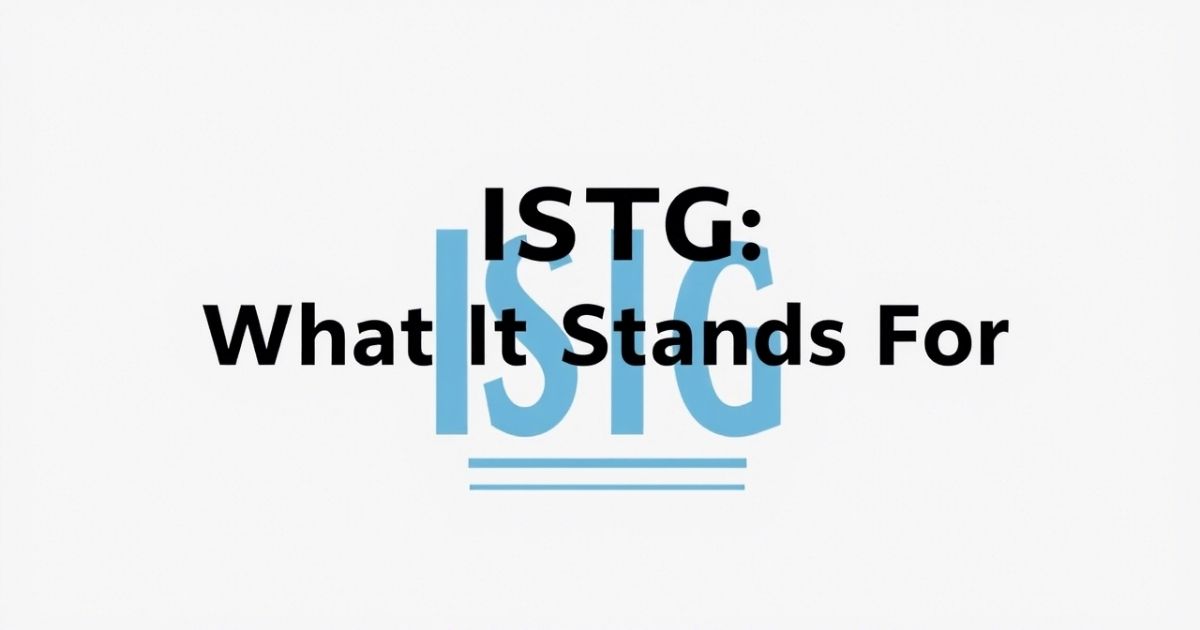“ISTG” is a popular term used in online chats and texting. If you’ve seen someone write “ISTG” and wondered what it means, you’re not alone! “ISTG” stands for “I swear to God.” It’s used to emphasize something, showing that you’re being serious or honest. But “ISTG” is more than just a phrase, it’s a way of adding emotion to your words in a simple and quick way.
So, what does “ISTG” mean exactly? The “ISTG abbreviation” is commonly used in casual conversations, especially by younger people. It’s an easy way to add a punch to your message. If you’ve ever asked yourself, “What is the meaning of ISTG?” Now you know! Next time you see “ISTG” in chat, you’ll understand it’s just a fun way to say you’re being totally serious. Let’s dive into more about “ISTG” and how to use it!
Unraveling the Meaning of ISTG
ISTG is an abbreviation that stands for “I swear to God.” It is a short way to show that someone is being serious, urgent, or strongly believes in what they are saying.
When someone says ISTG, they are basically telling you:
- “I am telling the truth.”
- “I am being completely honest.”
- “What I’m saying is the truth, and you can trust me.”
It is a way to add sincerity and make what they say sound more important or serious. People often use it to make sure the listener believes them or to stress their point more clearly.
Unleashing ISTG in Conversation
Now that we understand what ISTG means, let’s talk about how and when you can use it in conversations. It’s important to think about the tone (how you say it) and where you’re using it. Here are some common situations where ISTG works well:
1. Casual Conversations with Friends
When you’re chatting with friends or people you feel comfortable around, ISTG can make your words stand out more. It’s a fun and relaxed way to show that you’re serious about something, whether you’re joking or really excited about it. It adds emphasis without being too formal.
Example: “ISTG, that movie was so bad!”
Example: “ISTG, this new song is amazing, you’ll love it!”
In these examples, you’re just talking casually, but ISTG makes it clear you really mean it.
2. Expressing Frustration or Annoyance

If you’re upset or annoyed about something, ISTG is a way to show how serious you are about your frustration. It makes your feelings sound stronger, and even though it’s an exaggeration, it helps others understand you’re not happy.
Example: “ISTG, if the Wi-Fi stops again, I’m tossing my phone!”
Example: “ISTG, I’ve told you so many times to clean your room!”
In these examples, you’re saying you’re really annoyed or frustrated, but in a funny or dramatic way.
3. Making a Promise or Threat (Playfully)
You can use ISTG when making a playful promise or threat, especially with friends or people you’re close to. It makes the promise sound more serious, even if you’re just joking around.
Example: “ISTG, if you’re late again, I’m watching the movie without you!”
Example: “ISTG, I’ll eat all the pizza if you don’t hurry up!”
These examples show how you can make a fun threat or promise, but still keep it lighthearted.
Be Careful with Your Tone
While ISTG works well in casual situations, it’s important to use it in the right way. If you’re not careful, it can sound too serious, sarcastic, or even aggressive. Always think about the person you’re talking to and whether ISTG is the right choice for that conversation. Use it when you’re relaxed, joking, or with people who understand it’s meant to be playful.
Synonyms and Alternatives Words
Although “ISTG” (I swear to God) has become a widely used and recognized abbreviation, it’s not the only way to express a sense of emphasis, urgency, or firm conviction. There are several synonyms and alternative phrases that you can use to convey similar meanings in your conversations. Here are some options:
- I swear: This is the full version of “ISTG.” It carries more weight and seriousness, showing that you’re genuinely serious about what you’re saying.
- I promise: A direct way to express commitment or reliability, showing that you are making a serious pledge about something.
- Seriously: This word works as a versatile adverb. It can emphasize sincerity and importance, showing that what you’re saying is true or significant.
- For real: A casual, conversational phrase that expresses a similar level of conviction and sincerity as ISTG.
- No cap: This is a contemporary slang phrase used to indicate that the speaker is being honest and not exaggerating. It’s widely used in informal settings.
Each of these alternatives can be used based on the context, tone, and the audience you’re addressing. It’s important to choose the one that best fits the situation to ensure your message comes across clearly.
As with ISTG, it’s important to be mindful of how these expressions might be perceived. Use them respectfully, and be aware of the setting or cultural trends when choosing which one to use.
Related Guide:
35 Metaphors for Loyalty Meaning Explained: Discover the Power of Comparison
Antonyms
The opposite of ISTG would be expressions that downplay or signal a lack of seriousness. Here are a few antonyms:
- “Just kidding”: This shows you’re not being serious at all and that everything you said should be taken as a joke.
- “No big deal”: A relaxed and casual way of saying something isn’t important or serious.
- “Only joking”: Another phrase to signal that you didn’t mean what you said seriously and it shouldn’t be taken too intensely.
While ISTG emphasizes honesty and seriousness, these antonyms keep things lighthearted and relaxed, signaling that there is no need for intensity or importance in the conversation.
Who Uses ISTG?
ISTG is mainly popular with teens and young adults, especially those who are active on social media or prefer texting as their primary way of communicating. It’s a casual and friendly expression, making it best suited for informal conversations with peers.
You wouldn’t typically use ISTG in professional settings, like in formal emails or when texting someone you don’t know well. It’s strictly used for informal, relaxed conversations with close friends and acquaintances.
When to Use ISTG

Now that you understand ISTG, let’s see when it’s best to use it. Here are some perfect situations where ISTG fits naturally:
1. Showing You’re Honest
If you want someone to know you’re telling the truth, ISTG helps make your words sound real and believable. It adds extra seriousness to your statement.
Example:
“ISTG, I didn’t eat the last slice of pizza!”
This is a strong way to convince someone when they don’t believe you.
2. Expressing Annoyance or Frustration
ISTG is great when you’re annoyed or frustrated, especially with friends or family. It makes your feelings clear but in a funny or exaggerated way.
Example:
“ISTG, if this Wi-Fi stops again, I’m tossing my phone!”
This shows frustration but still keeps things lighthearted.
3. Making a Fun Promise or Threat
You can also use ISTG when jokingly making a promise or playful threat to a friend. It makes your words sound more serious but still fun.
Example:
“ISTG, if you’re late again, I’m watching the movie without you!”
It’s a playful way to tell your friend you mean business while keeping it light.
Understanding the Cultural Significance
ISTG has become a popular expression, especially among young people, thanks to social media and texting. It’s a way of showing that you’re serious, but it’s not meant to be taken too seriously.
The phrase comes from “I swear to God,” which has religious meaning, but in modern conversations, it is often used without thinking about its original meaning. Instead, it’s more about adding emphasis and showing that you’re being honest or genuine.
The use of ISTG reflects how language changes over time. Words and phrases that were once serious or formal can become casual and playful.
Many young people use ISTG in everyday conversations because it adds excitement to their speech. It’s also easy to type in text messages, making it very popular in online chats. Over time, phrases like ISTG have become a part of normal communication, especially on social media platforms.
In some cultures, using phrases like “I swear to God” is considered very serious, even sacred. However, in modern slang, ISTG is not meant to be disrespectful. It’s a way to show emphasis or sincerity in a light and playful way.
It’s common to hear this phrase in casual conversations among friends, but it’s important to remember that not everyone may be comfortable with it. Some people might find it disrespectful because of its religious roots.
The cultural significance of ISTG also shows how language evolves. It highlights how younger generations are using informal language to make their conversations more expressive.
While it might be used in a fun way among friends, it’s always good to be aware of your audience and how they might interpret the phrase. It’s all about balancing respect and fun in communication.
Responsible and Mindful Usage

When using ISTG, it’s important to think about the situation and the people you are talking to. Even though it’s a fun phrase to use with friends, it might not always be suitable for every conversation.
For example, using ISTG in a serious or formal setting, like a job interview or talking to elders, could make you seem disrespectful. It’s best to save it for casual conversations with people who understand it.
Another thing to keep in mind is that ISTG has religious roots. The full form of ISTG is “I swear to God,” which some people might find offensive or uncomfortable because it involves a higher power. While it’s used casually by many, it’s always good to be aware of who you’re talking to and if they might be upset by it.
Using it too much can also make it lose its meaning or make it sound like you’re not being serious when you actually are.
Being responsible with ISTG also means using it when it really fits. Don’t just say it for no reason or to sound cool. If you say ISTG too often, it might start to feel like you’re overusing it. This can make your words less meaningful.
When you do use it, make sure it’s at the right moment to show sincerity or emphasize something important.
Lastly, always be mindful of the tone you use with ISTG. If you say it in a harsh or sarcastic way, it can come across as rude. But if you use it playfully and with friends, it can be a fun and lighthearted way to communicate. The key is understanding when and how to use it, so you can be respectful while still having fun.
FAQs
What does ISTG stand for?
ISTG stands for “I swear to God.” It’s a way to emphasize seriousness or truthfulness in a statement, often used in informal conversations.
What does ISTG mean for Gen Z?
For Gen Z, ISTG is a casual way to express sincerity, disbelief, or frustration. It’s commonly used in texting and social media conversations.
What should I reply to ISTG?
When someone says ISTG, you can reply with “I believe you” or “That sounds serious.” Keep your response casual and aligned with the tone.
Does ISTG mean Instagram?
No, ISTG does not mean Instagram. It stands for “I swear to God,” often used to emphasize a statement. Don’t confuse it with Instagram!
Is ISTG offensive?
ISTG can be offensive if used inappropriately, especially in religious contexts. Always be mindful of your audience when using ISTG to avoid misunderstandings.
Conclusion
“ISTG” is a fun and easy way to express seriousness or emphasize honesty in online conversations. Now you know that “ISTG” means “I swear to God.” It’s commonly used in chats to show you’re being truthful or to add emotion to your message. Whether it’s in a text or social media, “ISTG” is a quick way to get your point across.
So, the next time you see “ISTG” in a chat, you’ll know exactly what it means. “ISTG” is just an abbreviation for showing how serious someone is. “ISTG” stands for “I swear to God” in chat, making it a popular phrase in casual conversations. Now you understand “what does ISTG mean” and “what is the meaning of ISTG”. It’s all about expressing yourself in a simple and fun way!

Atlas Reid is an experienced administrator with 5 years of expertise in managing operations, streamlining processes, and ensuring efficiency. Skilled in leadership, organization, and problem-solving to drive business success.








